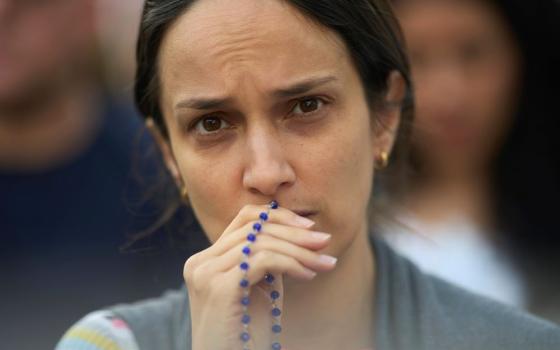Continued research into pornography show its ill effects on women and all of society, according to speakers May 16 at the Coalition to End Sexual Exploitation 2014 Summit in Vienna, a Washington suburb.
Based on her research, Gail Dines has concluded, "We have basically let the media and the pornographers become the sex educators" and that "the Internet has made boys porn-ready for dating." Dines is a sociology professor at Wheelock College in Boston and the founding president of Stop Porn Culture.
Dines, who considers herself a feminist, lashed out at how culture has turned gender roles on their head. "Who gets to be clothed and who gets to bare flesh (in posed photography) is an issue of power," she said. "We take the onus off the perpetrator" -- the media -- "and put it on the woman."
In this scenario, "rape is not a form of deviance," she declared. Instead, "rape is an over-conformity to the gender system as currently constructed."
Dines said, "Black girls are being punished at a high rate, as are black boys ... with all the time they spend in jail" because the media has made boys "hypersexualized."
Recent studies suggest that children may be getting their first exposure to pornography at age 11 on average. "The younger you get them, the longer you've got them," Dines said of the pornography purveyors. "It's like handing out cigarettes outside the middle school."
Cordelia Anderson, a Minneapolis-based counselor and the founding past president of the National Coalition to Prevent Child Sexual Abuse and Exploitation, said the prevalence of pornography in society should be treated as a public health problem. What characterizes porn as a public health problem, she added, was that it was beyond the ability of just one person or one organization to solve the problem.
Anderson cited a 2007 study that said that one in three children had their first exposure to porn before age 10. "These kids reported being more sexually aroused by violence," she said, "and want to consume more porn."
She added, "In reality, our kids have gone from Dr. Seuss to porn. ... They should not have to navigate this sexual toxicity."
Minors also may become more likely the targets of sexual exploitation in films. The adult-movie industry, according to Dines, has complained that it is too hard for them to comply with the terms of a 1995 law that mandates that all performers in movies and videos be at least 18 years old. "They're going to leave Los Angeles and go to Eastern Europe" where the laws won't apply, she predicted.
But that would hardly put American teen girls out of risk. A new strain of porn called "gonzo" features beatings and other violence as part of the sex act. Dines reported that when one girl went out on her first date with a boy, "he tried to strangle her," thinking this was normal and acceptable behavior based on the pornography he had viewed.
Children with intellectual disabilities not only "can engage in problematic sexual behavior," Anderson said, but they can at the same time "be more vulnerable to victimization."
Dawn Hawkins, chair of the Coalition to End Sexual Exploitation, said that pressure works for stemming the flow of pornography. She praised the Marriott hotel chain for removing pornography options in guest-room televisions; the summit was held at a Marriott hotel in the Tysons Corner area of Vienna.
Hawkins added that Google -- identified as one of Morality in Media's "Dirty Dozen" last year -- removed porn and soft-core porn pass-throughs from some of its apps after pressure. Google is still on the 2014 Dirty Dozen list, but instead of an all-out blasting of its business practices, has been given encouragement "to continue to improve their efforts to protect children and all who wish to be porn-free."
The U.S. bishops last November authorized the writing of a pastoral statement on pornography. The statement is still being drafted.



